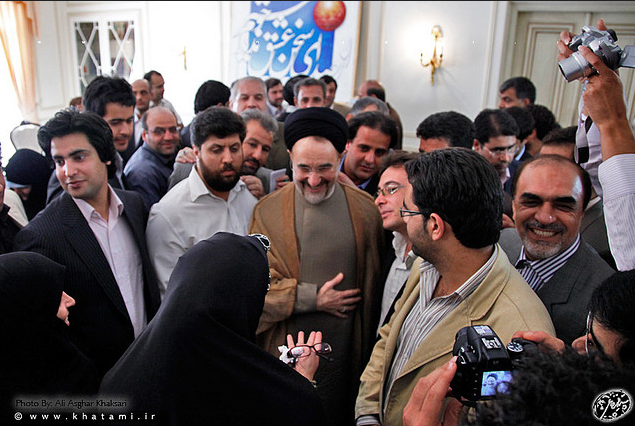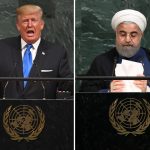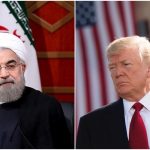by Tehran Correspondent
The judicial order of a media blackout on Mohammad Khatami and the reaction of Iranian social media users have once again highlighted the former president’s political importance. As the potentially pivotal 2016 parliamentary elections draw near, the pressure on Khatami— known as the “president of the reformist governments”—will increase.
According to the judicial order, announced Feb. 17 by judiciary spokesman Gholam Hossein Mohseni-Ejei, the media has been banned from mentioning Khatami or publishing his statements and photographs. During a press conference, Mohseni-Ejei said that the judiciary could issue rulings regarding individuals who are considered “the leaders of the sedition,” a derogatory term used to refer to opposition leaders and 2009 presidential candidates Mir Hossein Mousavi and Mehdi Karroubi, and Moussavi’s wife, Zahra Rahnavard, as well as Khatami himself. Originally an Arabic word, sedition, or Fetneh in Persian, implies the planning and implementing of acts that will disturb the peace and breach social, religious, or moral rules.
Ushered into the presidency in 1997 by a wave of hope and optimism, especially among young people, Khatami remains one of the Islamic Republic’s most popular political leaders even though he was largely unsuccessful at implementing lasting reforms. An editor-in-chief in Tehran, who spoke on condition of anonymity for security reasons, told Lobelog that Khatami’s popularity is related to his unique background and presidential legacy. “First off, Khatami is the symbol of reform in Iran,” said the editor. “He was the first person after the 1979 revolution who people trusted to bring changes to their lives.”
The source added that Khatami’s presidency symbolized a new era in Iranian history: “He has a great cultural and academic background—he has written and edited numerous of books—so he is a thinker…He has also always advocated moderation and non-violent actions. That’s why Iranians know Khatami as someone who has fought for freedom and democracy for almost two decades.”
Khatami, who held office until 2005, has chosen to operate within Iran’s political establishment; in essence, keeping one step away from challenging the entire regime. Yet he still participated in some of the massive protests following Iran’s disputed 2009 presidential election—which rocked the Islamic Republic—and were attacked by vigilante forces, including the Revolutionary Guard-backed Basij forces.
Since the house arrest of Mousavi and Karroubi in February 2011, Khatami has tried to fill the gaps left by the popular leaders in the public arena by supporting their positions and making several calls for their release, as well as that of all political prisoners, and promoting free elections.
“The creation of a safe and open space and the release of all political prisoners would soften the atmosphere and resolve or reduce the risks and threats that are imposed from outside the community,” said Khatami in December 2012 during a meeting with the husband of Nasrin Sotoudeh, the prominent human rights lawyer and opposition figure who was imprisoned at the time.
At the same time, Khatami has maintained significant differences with Mousavi’s and Karroubi’s political approach. For example, the former popular president has not independently issued any statement calling for citizens to take to the streets in protest.
Speaking on condition of anonymity, a member of the Participation Front, the main Iranian political reformist party (many of whose senior members were arrested after 2009), told Lobelog that Khatami stopped agreeing with street protests as early as the Fall of 2009: “[Khatami] thought that continued protests would not benefit the reformists and the Green Movement [which grew out of the protests against the election of conservative President Mahmoud Ahmadinejad].”
However, the source added, “if the Green Movement believes that political and social forces that intend to challenge the authority of conservative and extremist forces by operating within the legal structure of government is an important part of its strategy, Khatami is undoubtedly one of the main leaders.”
Iran’s main reformist newspapers, including Shargh, Etemad, Ebtekar, Qanun and Hambastegi, have been forced to comply with last month’s gag order. But Khatami’s supporters protested the media blackout through social media, including Facebook and with the Twitter hashtag, “We will be Khatami’s media” or “Mr. Special.” Both networks are illegal in Iran but still accessible through certain types of technology. Hundreds of journalists and political figures also replaced their Facebook profile photos with images of Khatami. Within 24 hours of the announcement, more than 25,000 users had joined the Facebook page: “We will be Khatami’s media.” That number has nearly doubled since the page was created.
On the other hand, the death of Khatami’s sister on Feb. 21 partially suspended Khatami’s isolation. Iranian President Hassan Rouhani publicly issued condolences in a statement that was featured on the front page of reformist newspapers last Monday. Rouhani’s immediate statement was generally interpreted as an indirect announcement of his support for Khatami’s positions and as criticism of the media blackout.
Khatami played a vital role in Rouhani’s successful June 2013 presidential bid. Initially, Khatami convinced Mohammad Reza Aref –the only reformist candidate—to withdraw from the competition and announce his public support for Rouhani by issuing a letter three days before the election. Immediately after Khatami announced he was backing the moderate cleric, Rouhani received a huge wave of support from Iranians in the last days of his campaign. That’s why Rouhani’s win came as a shock to many; it truly was a last-minute victory.
Khatami’s important role in Rouhani’s election and his lasting popularity have not been forgotten by political hard-liners. The 2016 parliamentary elections are more than a year away, but hard-liners are already trying to reduce Khatami’s public profile and influence. Meanwhile, the reformists hope to defeat the conservatives in the election by introducing moderate candidates and a coalition composed of figures who are supported by Rouhani’s government and former President Ali Akbar Hashemi Rafsanjani, all followed by Khatami’s endorsement.
Since the end of his presidency in 2005, Khatami has periodically given interviews to mainstream reformist newspapers such as Shargh and Etemad, discussing the reformists’ upcoming political strategies. This is another likely reason for the timing of the media ban—conservatives and other hard-liners are trying to silence Khatami before he enters the spotlight again.
Since 2003, hard-liners have held the majority of seats in Parliament. Of course, thousands of reformist forces never even had a chance to enter the election race because the Guardian Council, which vets candidates, rejected their bids.
But maintaining public support is far more difficult. Mohammadreza Jalaeipour, a prominent sociology professor at Tehran University and a senior member of Participation Front, said in a speech on February 18 in the city of Yazd: “If Khatami’s word did not carry influence, they would leave him alone. They saw the influence of his word in the 2013 election, and that’s why they are worried about the next parliamentary election.”
If nothing else, the media blackout against Khatami is yet another indication of the unpleasant reality that the Iranian political establishment still lacks a serious plan for allowing popular opposition voices like the reformists to participate in the political arena. Yet, as shown by Khatami’s legacy, which has endured despite immense pressure on him to retreat into the shadows, the regime’s efforts to silence such voices can prove counter-productive. The vast protests of 2009, which caught the world’s attention, have long since subsided, but Iranians, and particularly the conservative establishment, can’t seem to forget them. Until Iranian politicians learn to tolerate dissent, the politics of dissent will continue to simmer, and perhaps even grow.






As the popularity and power of the so called “moderates” grows in Iran we may see a few possible changes:
1. The moderates may take control of the House of Representatives (Majles) in next election
2. The Guardian Council majority, made up of 12 members, may shift to the moderates
3. The current leader’s (Khamenaie) health isn’t that good and Khatami could be elected by the GC to replace him if his health conditions worsen or if he dies.
4. The Pasdarans, the arm forces of Iran that are die-hard hardliners and control about 80% of Iran’s economy, may stage a Coup and suppress the moderates for many years to come!
Unfortunately, there’s strong possibility that the Pasdarans will stage a Coup and the Iranian revolution will follow the sequencing of many other revolutions happened in the past around the world.